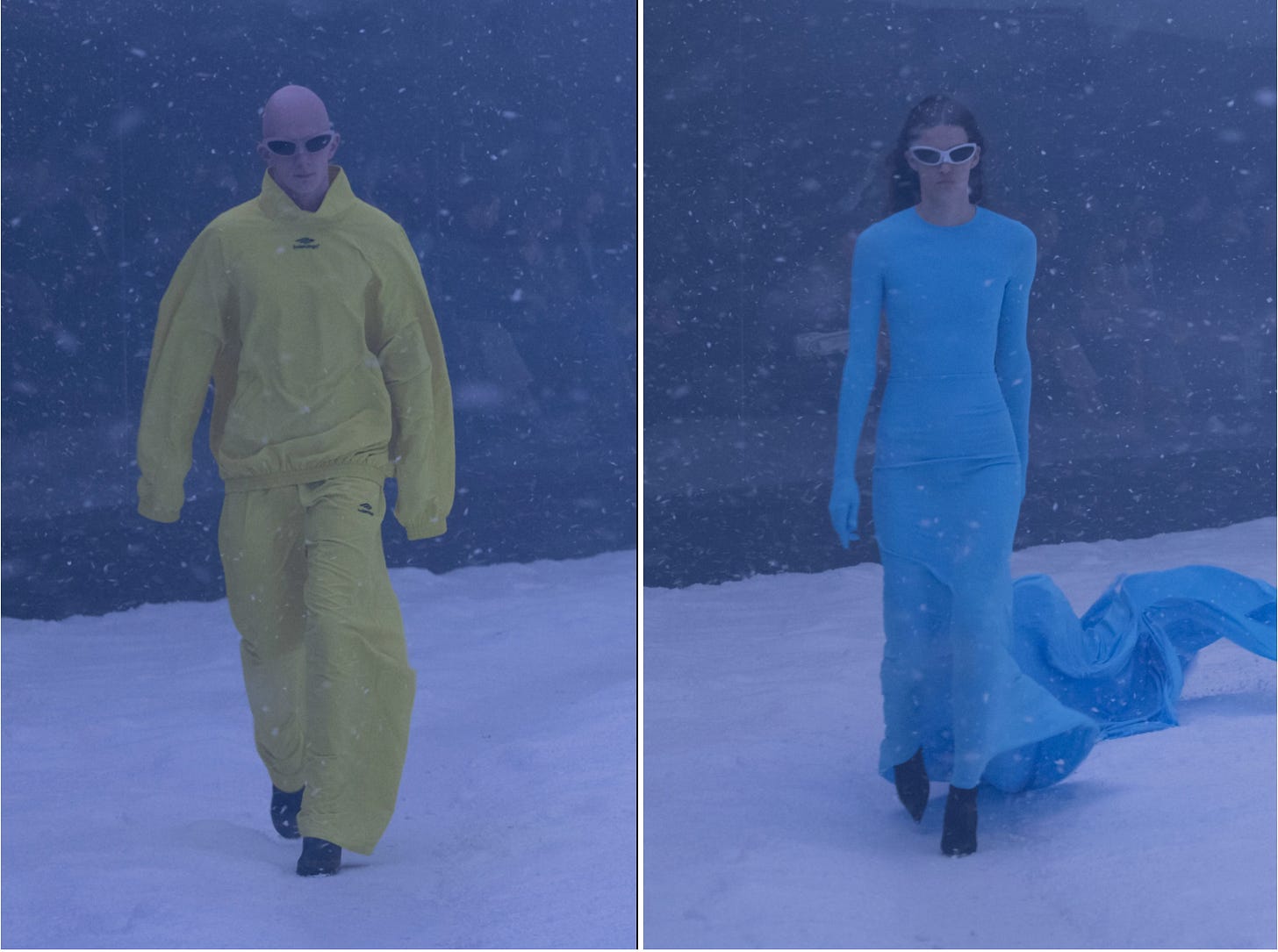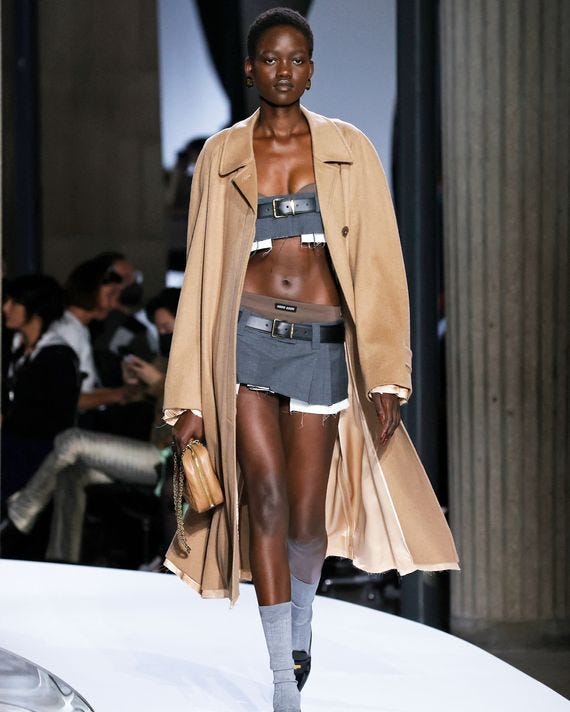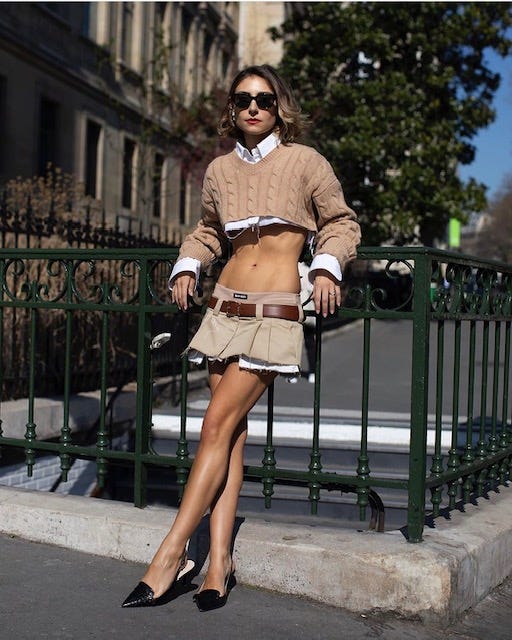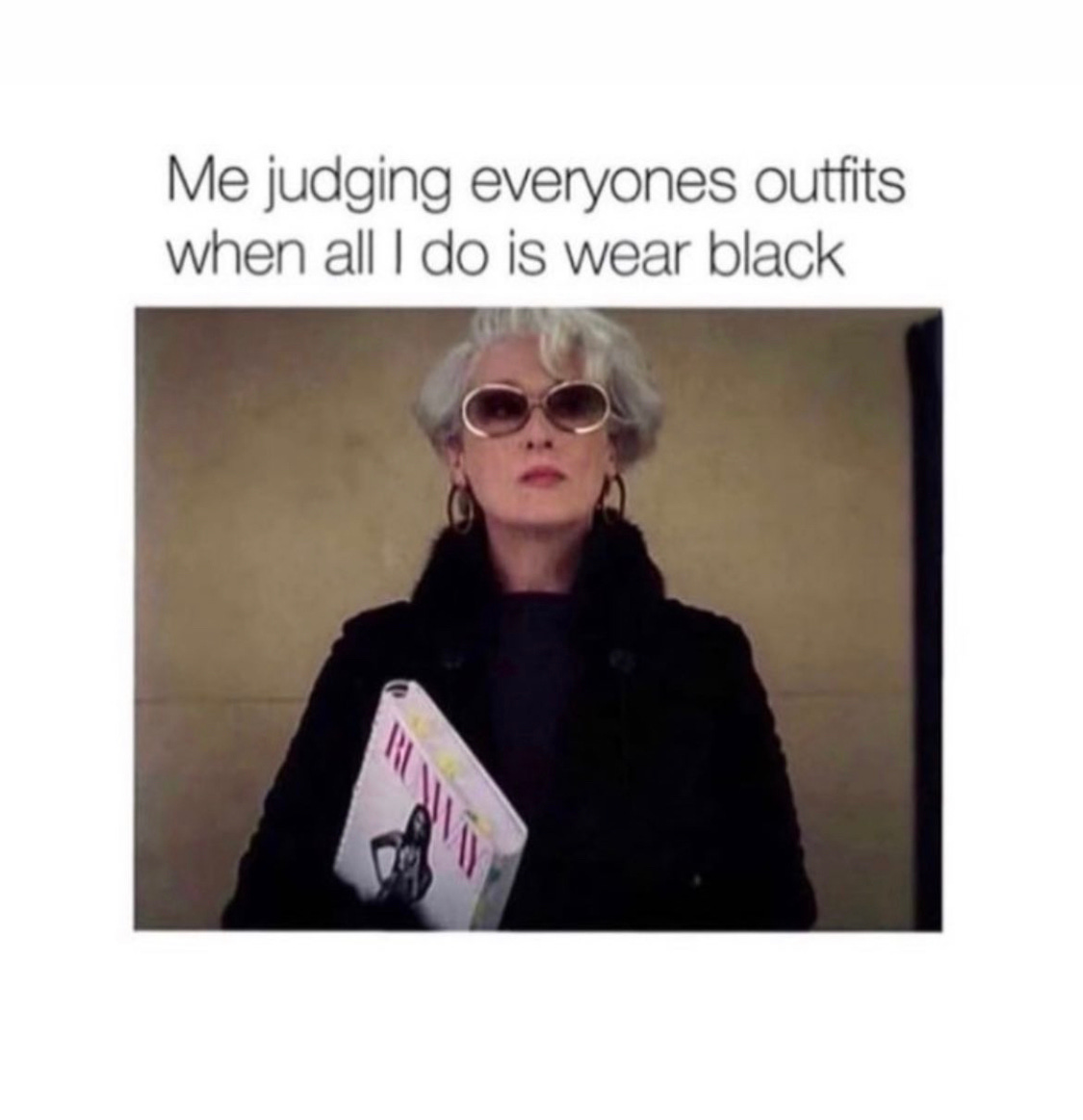#9 fashion in times of war, Joan Didion and the return of the mini-skirt
Hi there,
Spring is coming. I started a new job and I have been obsessively following all the Spring/Summer 2021 fashion shows or immersing myself in the words of inspiring female writers. Which sums up quite nicely what the mood is for most of the content of this newsletter.
Happy reading!
What I watched
The senseless war in Ukraine is casting a dark cloud over many frivolous things these days, also over this year’s Paris fashion week, questioning the existence of such events in these times. Balenciaga’s creative director Demna Gvasalia however, demonstrated with his recent show that he understands how to really use fashion. Models walked through a windy area filled with snow (originally a comment on climate change), carrying trash bags, capturing the displacement of refugees. He closed the show with two monochrome looks in blue and yellow. Demna fled Georgia, part of the Sovjet-Union at the time, as a child. All attendees received a note before the show. I also much enjoyed this profile of him (in Dutch) published in Dutch newspaper NRC early March.
I could not agree more with Leandra Medine in her analysis:
“What was so interesting about his use of the runway is that while the presence of clothes mattered (without them, the medium would not have made sense), whether this was a Fall or Spring or pre- collection really didn’t. The clothes on display were more like an instrument, and that let them play the part of best supporting role instead of lead actor, which perfectly summates, in my opinion, the real power of clothes.
While the most cynical among us may reject fashion altogether, calling it trivial or frivolous or in extreme cases harmful, the most enthusiastic may well forget that clothes don’t make for a great lead character. That actually, as Diana Vreeland once said, “it’s the life you live in the dress.” A great suit won’t get you a job, but it could help you unlock enough confidence to really nail the interview going in. Somewhere between complete dismissal of fashion and putting too much power into its hands is actually the sweet spot where it can thrive with integrity.
I think Gvasalia understands this. And as it relates to fashion week, he seems to recognize that putting the clothes front and center is still the objective, but not for the sake of selling them. This is what showroom appointments are for, what lookbooks can do, what salesfloors do do.
The opportunity on tap with a fashion show today is less about thinking so intently about selling the clothes, or making them the main event but really about using them as an instrument to get a point across.
Of course, depending on the creative director in question, this point will vary immensely. Gvasalia has a gift for distilling the energy of the cultural moment and offering it up with no apology, or compensatory message of relief. It can be quite uncomfortable to reckon with and in some ways, that is its gift to the audience (an opportunity to unpack the discomfort and do something with it) but again, depending on the brand and the creative at its helm, the point of view that’s being prioritized is no doubt going to change. Is supposed to be different, in fact.
A designer like Phoebe Philo, for example, whose gift is really for tapping into and accommodating the second-order needs of a woman might take the directive to reconsider the point of her show and spin out an experience that barely touches upon current events but is equally as resonant and relevant. What’s honest to a creative’s process and purpose seems to be the key here in turning the lock.
This is mostly to say that after years of manic energy circumnavigating the existential questions around fashion’s role moving forward, the dust may be starting to settle, with leaders of The New Way showing themselves through the risks that they take with their work.”
What I have been reading
Joan Didion died December last year. I had always put her on my reading list, but before she died, it did not come to be. The documentary on Netflix about her also did not motivate me to read it (I do not think it was interesting at all). After her death, I started reading the many profiles on her, especially this one by Zadie Smith who is one of my favorite writers and for whom Joan Didion was a huge inspiration. Smith writes:
“With notable exceptions, Didion was a woman who did not so much express opinions, or emotions, as interrogate both. If this still strikes us as unusual, it seemed unprecedented to me, when reading her for the first time in the late eighties. That she was a woman mattered, very much. When women writers of my generation speak in awed tones of Didion’s “style,” I don’t think it’s the shift dresses or the sunglasses, the cigarettes or commas or even the em dashes that we revere, even though all those things were fabulous. It was the authority. The authority of tone. There is much in Didion one might disagree with personally, politically, aesthetically. I will never love the Doors. But I remain grateful for the day I picked up “Slouching Towards Bethlehem” and realized that a woman could speak without hedging her bets, without hemming and hawing, without making nice, without poeticisms, without sounding pleasant or sweet, without deference, and even without doubt. It must be hard for a young woman today to imagine the sheer scope of things that women of my generation feared women couldn’t do—but, believe me, writing with authority was one of them. You wanted to believe it. You needed proof. And not Victorian proof. Didion—like her contemporary Toni Morrison—became Exhibit A. Uniquely, she could be kept upon your person, like a flick knife, stuffed in a back pocket, the books being so slim and portable. She gave you confidence. Shored you up. And did so not by rejecting the supposed realm of women, but by drilling down into it: “All one’s actual apprehension of what it is like to be a woman, the irreconcilable difference of it—that sense of living one’s deepest life underwater, that dark involvement with blood and birth and death . . .”
Now I have finally made it through her brilliant essay collection Slouching Towards Bethlehem. Some of my favorite excerpts below:
From On Self-Respect, first published in Vogue in 1961, which can be read in full here.
“People with self-respect have the courage of their mistakes. They know the price of things. If they choose to commit adultery, they do not then go running, in an access of bad conscience, to receive absolution from the wronged parties; nor do they complain unduly of the unfairness, the undeserved embarrassment, of being named corespondent. If they choose to forego their work—say it is screenwriting—in favor of sitting around the Algonquin bar, they do not then wonder bitterly why the Hacketts, and not they, did Anne Frank.
In brief, people with self-respect exhibit a certain toughness, a kind of moral nerve; they display what was once called character, a quality which, although approved in the abstract, sometimes loses ground to other, more instantly negotiable virtues. The measure of its slipping prestige is that one tends to think of it only in connection with homely children and with United States senators who have been defeated, preferably in the primary, for re-election. Nonetheless, character—the willingness to accept responsibility for one's own life—is the source from which self-respect springs.
(…)
“To have that sense of one's intrinsic worth which, for better or for worse, constitutes self-respect, is potentially to have everything: the ability to discriminate, to love and to remain indifferent. To lack it is to be locked within oneself, paradoxically incapable of either love or indifference. If we do not respect ourselves, we are on the one hand forced to despise those who have so few resources as to consort with us, so little perception as to remain blind to our fatal weaknesses. On the other, we are peculiarly in thrall to everyone we see, curiously determined to live out—since our self-image is untenable—their false notions of us. We flatter ourselves by thinking this compulsion to please others an attractive trait: a gift for imaginative empathy, evidence of our willingness to give. Of course we will play Francesca to Paolo, Brett Ashley to Jake, Helen Keller to anyone's Annie Sullivan: no expectation is too misplaced, no rôle too ludicrous. At the mercy of those we can not but hold in contempt, we play rôles doomed to failure before they are begun, each defeat generating fresh despair at the necessity of divining and meeting the next demand made upon us.”
From On Keeping a Notebook, an essay in 1969 but still relevant in the world world of today in which we record-keep our experiences on social media like Instagram:
“It is a difficult point to admit. We are brought up in the ethic that others, any others, all others, are by definition more interesting than ourselves; taught to be diffident, just this side of self-effacing. (‘You’re the least important person in the room and don’t forget it,’ Jessica Mitford’s governess would hiss in her ear on the advent of any social occasion; I copied that into my notebook because it is only recently that I have been able to enter a room without hearing some such phrase in my inner ear.) Only the very young and the very old may recount their dreams at breakfast, dwell upon self, interrupt with memories of beach picnics and favorite Liberty lawn dresses and the rainbow trout in a creek near Colorado Springs. The rest of us are expected, rightly, to affect absorption in other people’s favorite dresses, other people’s trout.”
(…)
“I think we are well advised to keep on nodding terms with the people we used to be, whether we find them attractive company or not. Otherwise they turn up unannounced and surprise us, come hammering on the mind’s door at 4 a.m. of a bad night and demand to know who deserted them, who betrayed them, who is going to make amends. We forget all too soon the things we thought we could never forget. We forget the loves and the betrayals alike, forget what we whispered and what we screamed, forget who we were.
(…)
It is a good idea, then, to keep in touch, and I suppose that keeping in touch is what notebooks are all about. And we are all on our own when it comes to keeping those lines open to ourselves: your notebook will never help me, nor mine you.”
What I will be wearing
I am taking on the mini-skirt this Spring/Summer. And I am not the only one. The catwalks and streets are full of it, as well as magazine covers. The 1990s and 2000s are back in fashion (the Y2K trend). I follow quite some fashion people on Instgram, and since the now famous Miu Miu mini-skirt made its debut on the runway in October 2021, it has been everywhere.
While this might not be too suitable for the office, mini-skirts (ok slightly less mini than the Miu Miu one) have definitely re-entered my wardrobe. Especially vintage ones from thick fabric, or leather are amazing. I do dress them down a bit with a plain t-shirt and trainers, or with chunky loafers and an oversized blazer.
What I cannot stop listening to
SAULT is a band I keep coming back to. They are a British music collective combining soul, funk, house, disco, alternative R&B, post-punk, and afrobeat influences with strong black-centric themes. The identities of the members are unknown. This song is a long time favorite, a great one to start your day or night with.
What made me smile
This meme. Yep.
Bisous,
Daphnie










